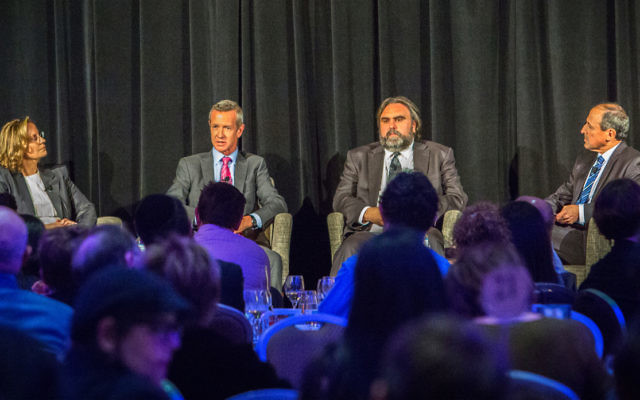Graf Oration hits close to home
The Trump factor, US-Israel relations, ISIS, the rise of China and the changing power balance in the Middle East were topics explored by an expert panel at Shalom’s 2016 Graf Oration on September 26.

THE Trump factor, US-Israel relations, ISIS, the rise of China and the changing power balance in the Middle East were topics explored by an expert panel at Shalom’s 2016 Graf Oration on September 26.
But what resonated most with the audience of 300 was a discussion about the importance of efforts to maintain unity, respect and inclusiveness in society to prevent the spread of global terror onto our shores.
Sydney Morning Herald political and international editor Peter Hartcher acknowledged, “We rely on our security systems to protect us and so far they have stopped a number of terrorist attacks, but the biggest risk factor for terrorism, in my view, is if we turn against ourselves – that is exactly what the Islamists want us to do.
“Last month’s poll by Essential Media that found 49 per cent of Australians support a ban on Muslim immigrants – that tells us we have a lot more work to do than we realise,” Hartcher said, drawing a round of applause.
Research director at the Lowy Institute Anthony Bubalo said, “There is no way to sugar coat that” Islamism, as a movement, “doesn’t have the same values we share”.
“But in the same way there is a spectrum of activism, there is a spectrum of responses,” he said. “It doesn’t always mean a tougher response is going to get you the outcome you want.”
When panel host NSW Jewish Board of Deputies CEO Vic Alhadeff steered the discussion onto US foreign policy, Associate Professor Leanne Piggott, national director of the Centre for Social Impact, said the post-Cold War period was unique because one major power [the US] was influencing the Middle East, but this has rapidly changed.
“What we are starting to see now are more familiar patterns – anybody who is anybody is back in the region,” Piggott said.
But she said that America’s recent $38 billion 10-year military aid package to Israel meant that “at least for the short term, irrespective of who is in the White House, Israel is getting its best deal.”
Bubalo said the US is “recalibrating” its presence in the Middle East, but still remains a major power.
“What’s changed is America’s willingness to use that power.”
Hartcher said the US has developed a reluctance “in its own competence to use its power, and we see chaos resulting in the region”.
SHANE DESIATNIK

comments